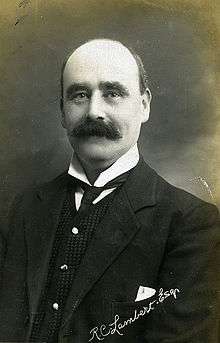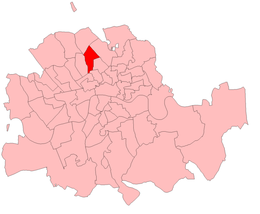Richard Cornthwaite Lambert
Richard Cornthwaite Lambert (5 May 1868 – 5 November 1939)[1] was a British barrister and Liberal Party politician

Early life
The son of the Reverend Richard U Lambert, vicar of Christ Church, Bradford on Avon, Somerset and his wife Agnes née Stanton, he was educated at Shrewsbury School and Trinity College, Cambridge, graduating with honours in history.[2]
He travelled widely in Europe and the Middle East before being called to the bar at the Inner Temple in 1892.[2] He practised law on the Midland Circuit.[2][3] In 1893 he married Lilian Burman of Four Oaks, Warwickshire, with whom he had 3 children.[2] One of his sons was Richard S. Lambert, who was to become editor of The Listener.[3]
Political career
He joined the Liberal Party. He sat on the Executive Committee of the London Liberal Federation. He stood as a Liberal candidate at Sheffield Ecclesall in 1906, at Sheffield Attercliffe at a by-election in 1909, and Portsmouth in January 1910.[4]
In 1907 he attempted to win a London County Council seat at West Islington for the Liberal-backed Progressive Party but was unsuccessful. However, in March 1910 he was elected to the London County Council at the second attempt;

He was elected to the House of Commons as Member of Parliament (MP) for Cricklade at the general election in December 1910,[5]
In 1913 he stood down from the London County Council. He was a pacifist. During the Great War he opposed the introduction of conscription into the armed services. He joined the Union of Democratic Control, a group of Liberal and Labour MPs who opposed military influence in government. In 1917 he wrote and had published 'The Parliamentary History of Conscription in Great Britain'. In 1918 he joined the Labour Party.[6] The Cricklade constituency was abolished at the 1918 general election, and Lambert did not stand for Parliament again.[7]
In 1922 he became librarian at the Athenaeum Club, London, holding the post until 1935.[3][2]
Election results
| Party | Candidate | Votes | % | ± | |
|---|---|---|---|---|---|
| Conservative | Samuel Roberts | 5,856 | 52.1 | -8.9 | |
| Liberal | Richard Lambert | 5,392 | 47.9 | +8.9 | |
| Majority | 464 | 4.2 | -17.8 | ||
| Turnout | 87.1 | +14.1 | |||
| Conservative hold | Swing | ||||
| Party | Candidate | Votes | % | ± | |
|---|---|---|---|---|---|
| Labour | Joseph Pointer | 3,531 | 27.5 | N/A | |
| Conservative | Sydney Charles King-Farlow | 3,380 | 26.2 | -20.6 | |
| Liberal | Richard Lambert | 3,175 | 24.6 | -28.6 | |
| Ind. Conservative | Arnold Muir Wilson | 2,803 | 21.7 | N/A | |
| Majority | 151 | 1.3 | -5.1 | ||
| Turnout | 77.3 | -1.9 | |||
| Labour gain from Liberal | Swing | N/A | |||
| Party | Candidate | Votes | % | ± | |
|---|---|---|---|---|---|
| Conservative | 16,777 | 28.80 | N/A | ||
| Liberal Unionist | 15,592 | 26.76 | N/A | ||
| Liberal | Thomas Bramsdon | 12,397 | 21.28 | -1.31 | |
| Liberal | Richard Lambert | 9,965 | 17.10 | N/A | |
| Labour | William Sanders | 3,529 | 6.06 | -11.52 | |
| Turnout | 58,260 (30,100 voted) | 89.41 | +6.59 | ||
| Party | Candidate | Votes | % | ± | |
|---|---|---|---|---|---|
| Progressive | 3,193 | ||||
| Progressive | 3,172 | ||||
| Municipal Reform | H J Clarke | 2,542 | |||
| Municipal Reform | F Russell Davies | 2,524 | |||
| Majority | |||||
| Progressive gain from Municipal Reform | Swing | ||||
| Progressive gain from Municipal Reform | Swing | ||||
| Party | Candidate | Votes | % | ± | |
|---|---|---|---|---|---|
| Liberal | Richard Lambert | 6,937 | 50.5 | +2.7 | |
| Liberal Unionist | Thomas Calley | 6,809 | 49.5 | -2.7 | |
| Majority | 128 | 1.0 | 5.4 | ||
| Turnout | 90.4 | ||||
| Liberal gain from Liberal Unionist | Swing | +2.7 | |||
References
- "House of Commons constituencies beginning with "C" (part 6)". Leigh Rayment's House of Commons page. Retrieved 26 November 2009.
- "LAMBERT, Richard Cornthwaite". Who Was Who. Oxford University Press. December 2007. Retrieved 7 February 2012.
- "Obituary: Mr R. C. Lambert". The Times. 6 November 1939. p. 9.
- Craig, F. W. S. (1989) [1974]. British parliamentary election results 1885–1918 (2nd ed.). Chichester: Parliamentary Research Services. pp. 171, 183, 186. ISBN 0-900178-27-2.
- Craig, F. W. S. (1989) [1974]. British parliamentary election results 1885–1918 (2nd ed.). Chichester: Parliamentary Research Services. p. 415. ISBN 0-900178-27-2.
- The Downfall of the Liberal Party, 1914–1935 by Trevor Wilson
- Craig, F. W. S. (1983) [1969]. British parliamentary election results 1918–1949 (3rd ed.). Chichester: Parliamentary Research Services. ISBN 0-900178-06-X.
- London Municipal Notes, 1913
- British parliamentary election results, 1885–1918 (Craig)
External links
- Hansard 1803–2005: contributions in Parliament by Richard Lambert
| Parliament of the United Kingdom | ||
|---|---|---|
| Preceded by Thomas Calley |
Member of Parliament for Cricklade December 1910 – 1918 |
Constituency abolished |